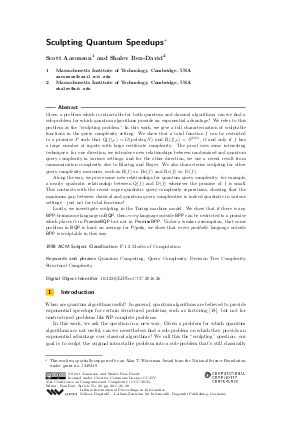Sculpting Quantum Speedups
Authors Scott Aaronson, Shalev Ben-David
-
Part of:
Volume:
31st Conference on Computational Complexity (CCC 2016)
Part of: Series: Leibniz International Proceedings in Informatics (LIPIcs)
Part of: Conference: Computational Complexity Conference (CCC) - License:
 Creative Commons Attribution 3.0 Unported license
Creative Commons Attribution 3.0 Unported license
- Publication Date: 2016-05-19
File

PDF
LIPIcs.CCC.2016.26.pdf
- Filesize: 0.58 MB
- 28 pages
Document Identifiers
Subject Classification
Keywords
- Quantum Computing
- Query Complexity
- Decision Tree Complexity
- Structural Complexity
Metrics
- Access Statistics
-
Total Accesses (updated on a weekly basis)
0PDF Downloads0Metadata Views
Abstract
Given a problem which is intractable for both quantum and classical algorithms, can we find a sub-problem for which quantum algorithms provide an exponential advantage? We refer to this problem as the "sculpting problem." In this work, we give a full characterization of sculptable functions in the query complexity setting. We show that a total function f can be restricted to a promise P such that Q(f|_P)=O(polylog(N)) and R(f|_P)=N^{Omega(1)}, if and only if f has a large number of inputs with large certificate complexity. The proof uses some interesting techniques: for one direction, we introduce new relationships between randomized and quantum query complexity in various settings, and for the other direction, we use a recent result from communication complexity due to Klartag and Regev. We also characterize sculpting for other query complexity measures, such as R(f) vs. R_0(f) and R_0(f) vs. D(f).
Along the way, we prove some new relationships for quantum query complexity: for example, a nearly quadratic relationship between Q(f) and D(f) whenever the promise of f is small. This contrasts with the recent super-quadratic query complexity separations, showing that the maximum gap between classical and quantum query complexities is indeed quadratic in various settings - just not for total functions!
Lastly, we investigate sculpting in the Turing machine model. We show that if there is any BPP-bi-immune language in BQP, then every language outside BPP can be restricted to a promise which places it in PromiseBQP but not in PromiseBPP. Under a weaker assumption, that some problem in BQP is hard on average for P/poly, we show that every paddable language outside BPP is sculptable in this way.
Cite As Get BibTex
Scott Aaronson and Shalev Ben-David. Sculpting Quantum Speedups. In 31st Conference on Computational Complexity (CCC 2016). Leibniz International Proceedings in Informatics (LIPIcs), Volume 50, pp. 26:1-26:28, Schloss Dagstuhl – Leibniz-Zentrum für Informatik (2016)
https://doi.org/10.4230/LIPIcs.CCC.2016.26
BibTex
@InProceedings{aaronson_et_al:LIPIcs.CCC.2016.26,
author = {Aaronson, Scott and Ben-David, Shalev},
title = {{Sculpting Quantum Speedups}},
booktitle = {31st Conference on Computational Complexity (CCC 2016)},
pages = {26:1--26:28},
series = {Leibniz International Proceedings in Informatics (LIPIcs)},
ISBN = {978-3-95977-008-8},
ISSN = {1868-8969},
year = {2016},
volume = {50},
editor = {Raz, Ran},
publisher = {Schloss Dagstuhl -- Leibniz-Zentrum f{\"u}r Informatik},
address = {Dagstuhl, Germany},
URL = {https://drops.dagstuhl.de/entities/document/10.4230/LIPIcs.CCC.2016.26},
URN = {urn:nbn:de:0030-drops-58538},
doi = {10.4230/LIPIcs.CCC.2016.26},
annote = {Keywords: Quantum Computing, Query Complexity, Decision Tree Complexity, Structural Complexity}
}
Author Details
References
-
Scott Aaronson. Quantum certificate complexity. SIAM Journal on Computing, 35(4):804-824, 2006.

-
Scott Aaronson, Shalev Ben-David, and Robin Kothari. Separations in query complexity using cheat sheets. arXiv preprint http://arxiv.org/abs/arXiv:1511.01937, 2015.

-
Andris Ambainis, Kaspars Balodis, Aleksandrs Belovs, Troy Lee, Miklos Santha, and Juris Smotrovs. Separations in query complexity based on pointer functions. arXiv preprint http://arxiv.org/abs/arXiv:1506.04719, 2015.

- Robert Beals, Harry Buhrman, Richard Cleve, Michele Mosca, and Ronald de Wolf. Quantum lower bounds by polynomials. Journal of the ACM, 48(4):778-797, 2001. http://arxiv.org/abs/arXiv:quant-ph/9802049, URL: http://dx.doi.org/10.1145/502090.502097.
-
Leonard Berman and Juris Hartmanis. On isomorphisms and density of np and other complete sets. SIAM Journal on Computing, 6(2):305-322, 1977.

- Harry Buhrman and Ronald de Wolf. Complexity measures and decision tree complexity: a survey. Theoretical Computer Science, 288(1):21-43, 2002. URL: http://dx.doi.org/10.1016/S0304-3975(01)00144-X.
-
Harry Buhrman, Lance Fortnow, Ilan Newman, and Hein Röhrig. Quantum property testing. SIAM Journal on Computing, 37(5):1387-1400, 2008.

-
Richard Cleve. The query complexity of order-finding. Information and Computation, 192(2):162-171, 2004.

-
Philippe Flajolet and Jean-Marc Steyaert. On sets having only hard subsets. In Automata, Languages and Programming, pages 446-457. Springer, 1974.

-
Jorge E Hirsch. An index to quantify an individual’s scientific research output. Proceedings of the National academy of Sciences of the United States of America, 102(46):16569-16572, 2005.

-
Bo'az Klartag and Oded Regev. Quantum one-way communication can be exponentially stronger than classical communication. In Proceedings of the forty-third annual ACM symposium on Theory of computing, pages 31-40. ACM, 2011.

-
Ilan Kremer. Quantum communication. PhD thesis, Citeseer, 1995.

- Raghav Kulkarni and Avishay Tal. On fractional block sensitivity. Electronic Colloquium on Computational Complexity (ECCC) http://eccc.hpi-web.de/report/2013/168/, 2013.
-
Stuart A Kurtz, Stephen R Mahaney, and James S Royer. The isomorphism conjecture fails relative to a random oracle. Journal of the ACM (JACM), 42(2):401-420, 1995.

-
Ran Raz. Exponential separation of quantum and classical communication complexity. In Proceedings of the thirty-first annual ACM symposium on Theory of computing, pages 358-367. ACM, 1999.

-
Norbert Sauer. On the density of families of sets. Journal of Combinatorial Theory, Series A, 13(1):145-147, 1972.

-
Saharon Shelah. A combinatorial problem; stability and order for models and theories in infinitary languages. Pacific Journal of Mathematics, 41(1):247-261, 1972.

- Peter W. Shor. Polynomial-time algorithms for prime factorization and discrete logarithms on a quantum computer. SIAM Journal on Computing, 26(5):1484-1509, 1997. URL: http://arxiv.org/abs/quant-ph/9508027.
-
Andrew Chi-Chih Yao. Probabilistic computations: toward a unified measure of complexity. In Annual Symposium on Foundations of Computer Science, volume 17, page 222. Institute of Electrical and Electronics Engineers, 1977.

-
Bohua Zhan, Shelby Kimmel, and Avinatan Hassidim. Super-polynomial quantum speed-ups for boolean evaluation trees with hidden structure. In Proceedings of the 3rd Innovations in Theoretical Computer Science conference, pages 249-265. ACM, 2012.

